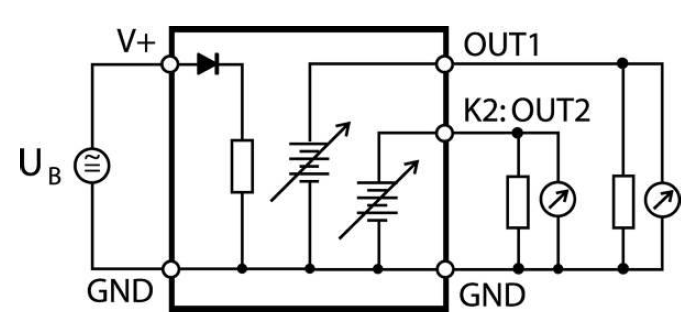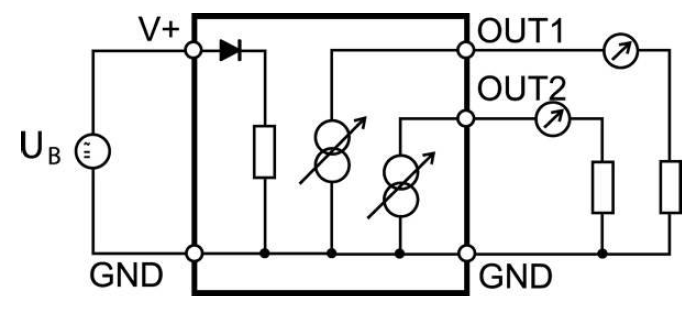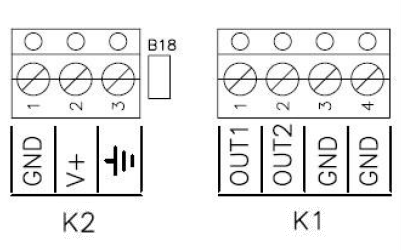This section provides detailed instructions on how to properly connect the HFM53 device to power sources and other necessary components. It covers all possible wiring options. Proper attention to these steps is essential to guarantee reliable and safe functionality of the device.
General guidelines for signal cables
Heavy machinery and instrumentation should not share the same power supply wiring. If this cannot be avoided, noise filters and surge protectors should be used. Most UPS devices have those features already integrated.
Whenever the level of electromagnetic interference is expected to be high, both the instruments and signal cables should be placed as far away as possible from the source of interference.
In general, signal cables should be installed in bundles or channels / conduits, separate from other cables as indicated in the table below:
Signal |
Bundles or Channels |
•Bus signals such as RS485 •Data signals for PCs, printers etc. shielded analog inputs unshielded direct current (<= 60V) shielded process signals (<= 25 V) •unshielded alternate current (<= 25V) coaxial cables for CRT monitors |
in common bundles or channels / conduits |
•direct current from 60 V to 400 V (unshielded) •alternate current from 25V to 400 V (unshielded) |
in separated bundles or channels / conduits, without minimum distance |
•direct and alternate current > 400 V (unshielded) •Telephone lines •lines leading into EX-rated areas |
in separated bundles or channels / conduits, without minimum distance |
Lightning protection
Cabling in areas with a risk of lightning requires a lightning protection. For cabling underground in between buildings, we recommend the use of special fiber optic cables. If this is not possible, use copper cables that are suitable for underground installation.
Cable grip and cable specifications
The HFM53 is supplied either with one M16 sealing cable grip. The M16 cable grip provides effective sealing only with cables having the proper outside diameter. Preferably, use a cable with an outside diameter of 6 to 7 mm (0.236 to 0.275 inch) with 18 AWG wires.
Wiring Diagram
Voltage outputs
Electrical diagram |
Description |
 |
The maximum permissible cable length can be determined under consideration of the voltage drop caused by the current flowing to the devices connected to the unit. The voltage drop in the cable depends both on cable resistance and on the equivalent resistance of the devices connected in parallel to the unit. The total resistance connected to each unit output should be at least 1000 ohms. Cable resistance should not be more than 1/1000 of the load resistance. |
Current outputs
Electrical diagram |
Description |
 |
The maximum permissible cable length can be determined under consideration of the voltage drop caused by the current flowing to the devices connected to the unit. The voltage drop in the cable depends both on cable resistance and on the equivalent resistance of the devices connected in parallel to the unit. The total resistance connected to each unit output should be at least 1000 ohms. Cable resistance should not be more than 1/1000 of the load resistance. |
Terminal outputs
Terminal Overview |
Analog Terminal Description |
|
 |
K2-1: GND
K2-2: V+
K2-3: * |
Power supply (-) or neutral (tied with other GND)
Power supply: 15…40 VDC (+) or 12…28 VAC (Phase)
Protective ground |
K1-1: OUT1
K1-2: OUT2
K1-3: GND
K1-4: GND
|
Relative humidity or dew point (+)
Temperature output (+)
Ground (tied with other GND)
Ground (tied with other GND)
|
|
Note: Terminal K2-3 (protective or earth ground) is not tied with GND. If so desired, K2-3 can be tied with GND by closing a solder pad on the PCB
Note: Operation of the HFM53 does not require both measurement loops to be closed. When using the HFM53 to measure either humidity only or temperature only, close only the loop that is being used. It's recommend grounding the (-) side of the power supply, especially if the electronics will be subjected to a low humidity environment (35 %RH or less).